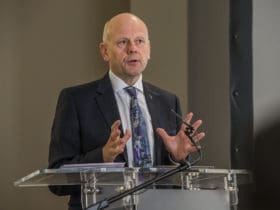Support for people and families in Wales who are facing financial crisis has fallen by almost 50% since 2010, according to research by The Children’s Society.
In 2018/19 the Welsh Government spent £10.6m on the Discretionary Assistance Fund (DAF), which provides grants to help those hit by a financial emergency or in need of help to live in the community after a period in institutional care. This compares to £20.5 million spent in 2010/11.
The charity argues that this huge decrease in funding has left thousands of families and vulnerable people struggling with nowhere to turn.
Until 2013, crisis support in Wales had been the responsibility of the UK government through the provision of “Crisis Loans” and “Community Care Grants”. These schemes were scrapped in 2013 and the Welsh government, introduced the DAF in their place.
In the first year of the DAF just £7.8 million was given to almost 28,000 applicants, compared to almost £12.1million given to almost 60,000 applicants in the final year of the crisis loans and community care grants.
Although funding has recently increased – including an additional £1 million planned for this year, Dr. Sam Royston, Director of Policy and Research at The Children’s Society, said:
“These funds are for people and families who desperately need them. They are designed to cover one off emergencies, such as a boiler breakdown or a flood in the home. They are also there to help incredibly vulnerable people move into independent living.
“There is no evidence that levels of need for emergency financial support have fallen since 2010, so to see such a large reduction in spending is deeply concerning. People already facing incredibly stressful situations are finding themselves with nowhere to turn and are more likely to become destitute.”
The DAF is split into two types of grants. The Emergency Assistance Payment (EAP) is designed to cover immediate essentials such as bills, food, clothing and transport in the wake of an unexpected disaster or family emergency.
The Individual Assessment Payment (IAP) helps highly vulnerable groups such as care leavers or those leaving an institution, to cover a one-off expense.
Analysis by the charity found spending between 2010/11 and 2017/18 on IAPs dropped by 41%. Spending on EAPs fell by 81% over the same period – although expenditure has been rising in recent years. At its lowest point in 2014/15 just £620,000 was spent on EAP’s, compared to £11.1 million spent on Crisis Loans in 2010.
Yet these payments can make a huge difference when families receive them. In one case a single mother of two young children, one of whom has a learning disability, applied to the DAF. She had been sharing a bed with her children, had been forced to use an expensive launderette to do all the families washing and did not have a fully working oven. She was awarded an EAP of two beds and the white goods she needed. She said:
“Having my own washing machine is something I never thought I would have. It makes a real difference to my day, making my life that little bit easier and gives me more time for the children.”
Despite recent rises in expenditure, and a welcome additional £1 million investment in the coming financial year, The Children’s Society says much more still needs to be done.
As well as additional investment in the DAF, the charity is calling for the Welsh Government to work more closely with voluntary and community sector partners to ensure that people receive follow up after the point of crisis, to reduce the likelihood of financial crises recurring. Nerys Sheenan from ACE (Action in Caerau and Ely) is supporting the charity’s recent recommendations. She said:
“It’s vital we see long-term investment in the DAF to improve provision and build a better safety net for anyone facing financial crisis. The fact remains that even though levels of spending have increased they are still only half of what they once were and, taking inflation into account, the money given out is not enough.
“The Welsh Government should not only raise more awareness of the scheme, they should also look at working with the voluntary and community sector to improve the level of ongoing support it gives to those receiving help. By addressing any underlying difficulties they can reduce the frequency with which claimants require repeat payments.”








Leave a Reply
View Comments